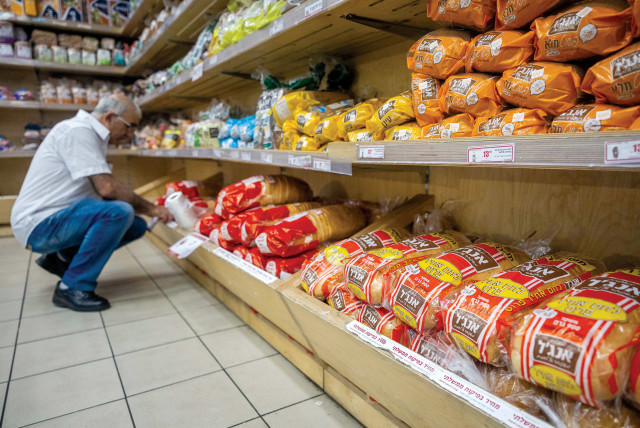Israel is losing the war on poverty - opinion

The war on poverty is just as existential for hundreds of thousands of families struggling with it. As of now, however, in this area, the outcome appears to be absolute loss.
Israel has entered an existential battle that began several years ago. The spread of polarizing and divisive rhetoric started creating cracks in society, while the judicial overhaul and fundamental conflicts over values such as the conscription law divided us into two camps. The disaster of October 7, which continues to haunt us over a year later, has left us stunned, bleeding, and in pain, with a bleak outlook ahead.
In addition to the military conflict on multiple fronts and the internal ideological and value-based struggles symbolizing the ongoing fight over the character and identity of Israeli society, we must not forget another exhausting and difficult war that has been ongoing for 30 years – one that continues alongside and between other battles. This is the war on poverty.
This war has no enlisted army, no emergency call-ups, no procurement budgets, no strategy, no goals, and no cabinet to debate operational plans or post-war policies. It has no tangible enemy and no victors. But it does have losers – approximately 2.76 million of them. The poor.
The poor: The losers of Israel's war on poverty
While there may be no fatalities in this battle, there are many casualties, both physical and emotional. Chief among them are children, single parents, large families in geographic and social peripheries, Holocaust survivors, and elderly individuals who face a constant struggle for survival both in times of crisis and so-called routine.
When a security conflict erupts and the economy spirals, the economic implications are dramatic. The heavy costs of military confrontation, coupled with the prolonged recovery process, are exacerbated by inflation, fears of a recession, high interest rates, and sharp increases in the prices of food and basic goods, bringing us to the brink of an economic crisis.
This is clearly reflected in the alternative poverty line, which stands at NIS 5,355 per person and NIS 13,617 per family – well above the National Insurance Institute’s poverty threshold. For lower-income declines and vulnerable populations, the consequences are devastating. Their circumstances worsen, poverty deepens, and the struggle with hardship threatens to overwhelm many families.
Surprisingly, poverty levels and food insecurity remained massive but stable this year. This can be attributed to the civil sector’s efforts, providing aid worth at least NIS 1 billion, and to government payments for evacuees, reservists, and businesses, which partially trickled down to the lower-income groups.
It could have been much worse and likely will be once government and civil interventions return to pre-crisis levels or even drop below them.
Meanwhile, new “prisoners” are taken in this war on poverty. For some, the crisis will be temporary until they manage to recover and regain stability. For others, it will lead to a downward spiral of debt and distress, from which it is nearly impossible to escape, pushing them into poverty.
Tens of thousands from the lower-middle class are at risk of this fate, as they cannot keep up with the rising cost of living and see their quality of life deteriorate sharply.
WHILE THE ability to meet basic needs is reflected in the minimum cost of living, the normative cost of living, at NIS 8,665 per person and NIS 22,181 per household, which includes additional expenses, such as extracurricular activities or supplemental health insurance, highlights the fragility of Israel’s middle class.
The fact that only the top income declines can meet these costs underscores the deep gaps in our society and the challenges faced by the majority of the population in living a dignified life.
Successive Israeli governments have shown little concern for the poor, as evidenced by budget allocations that reflect a national priority devoid of distributive justice. Defense spending remains the largest budgetary priority, even in times of relative peace. At the same time, coalition funds, non-essential political considerations, and minimal investment in social welfare prevail.
The government not only failed to allocate dedicated funding for essential needs through aid organizations during the war but also approved an anti-social budget with harsh measures disproportionately impacting the underprivileged. These include an expected VAT increase of at least 1%, a freeze on child allowances, higher National Insurance Institute (NII) contributions, and likely drastic cuts to all government services.
The Finance Ministry’s narrative that “everyone will bear the burden of cuts” is as far removed from reality as the claim that “everyone carries the national burden.”
The current situation disproportionately burdens the vulnerable and the workers on one side and the soldiers on the other. While absolute victory may not be possible in the military arena, some form of victory is imperative – simply because we have no alternative. After all, this is an existential battle.
The same is true for internal resilience and fundamental values, such as solidarity and mutual responsibility, which are essential to the continuation of the Zionist enterprise. The war on poverty is just as existential for hundreds of thousands of families struggling with it. As of now, however, in this area, the outcome appears to be absolute loss.
The writer is CEO of Latet.
Jerusalem Post Store
`; document.getElementById("linkPremium").innerHTML = cont; var divWithLink = document.getElementById("premium-link"); if (divWithLink !== null && divWithLink !== 'undefined') { divWithLink.style.border = "solid 1px #cb0f3e"; divWithLink.style.textAlign = "center"; divWithLink.style.marginBottom = "15px"; divWithLink.style.marginTop = "15px"; divWithLink.style.width = "100%"; divWithLink.style.backgroundColor = "#122952"; divWithLink.style.color = "#ffffff"; divWithLink.style.lineHeight = "1.5"; } } (function (v, i) { });

